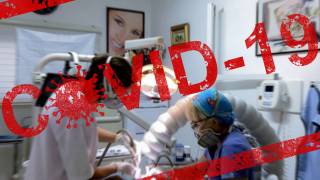MERS Vaccine Candidate Holds Promise for Other Coronaviruses

Researchers at the Universities of Iowa and Georgia announced they developed a vaccine candidate that fully protects mice against a lethal dose of Middle East Respiratory Syndrome (MERS), which is a coronavirus similar to SARS-CoV-2.
Published on April 7, 2020, the team led by Paul McCray, M.D., at the UI Carver College of Medicine, and Biao He, Ph.D., at the University of Georgia College of Veterinary Medicine, this pre-clinical study found that just one, low-dose of the vaccine given to the mice intranasally was sufficient to fully protect all the treated mice from a lethal dose of MERS coronavirus.
When the researchers analyzed the immune responses generated by the vaccine, they found that both antibodies and protective T cells were produced.
However, the antibody response was quite weak and it seems most likely that the vaccine’s protective effect is due to the T cell response in the mouse lungs.
“Our new study indicates that PIV5 may be a useful vaccine platform for emerging coronavirus diseases, including SARS-CoV-2, the virus causing the ongoing COVID-19 pandemic,” said Dr. McCray, in a press release.
“We are planning more studies in animals to test the ability of PIV5-based vaccines in preventing disease caused by SARS-CoV-2.”
The vaccine is an innocuous parainfluenza virus (PIV5) carrying the “spike” protein that MERS uses to infect cells.
The researchers note several factors that make PIV5 expressing a coronavirus spike protein an appealing platform for vaccine development against emerging coronaviruses.
- First, PIV5 can infect many different mammals, including humans, without causing disease.
- PIV5 is also being investigated as a vaccine for other respiratory diseases including respiratory syncytial virus (RSV) and influenza.
- Second, the fact that a low dose of the vaccine was sufficient to protect the mice might be beneficial for creating enough vaccine for mass immunization.
- And finally, the vaccine in the current study was the most effective MERS vaccine to date in animal models of the disease, said these researchers.
Currently, there are various MERS vaccine candidates in ongoing phase 1 clinical studies.
From 2012 until January 31, 2020, the total number of laboratory-confirmed MERS-CoV infection cases reported globally to WHO was 2,519, with 866 associated fatalities, from 27 different countries.
The vast majority of these MERS-CoV cases were confirmed by the Kingdom of Saudi Arabia. From January 2020 to March 2, 2020, 35 MERS-CoV cases have been reported in Saudi Arabia.
Furthermore, unlike some of its regional allies, Saudi Arabia took the deadly SARS-CoV-2 coronavirus outbreak seriously, right from the outset.
As of March 28, 2020, data sources indicate the Kingdom has confirmed 1,104 coronavirus cases and just 3 fatalities related to COVID-19 disease.
This research was funded in part by grants from the National Institutes of Health (AI060699, DK-54759), and the Cystic Fibrosis Foundation.
Dr. McCray is supported by the Roy J. Carver Charitable Trust. And Dr. Biao He is supported by an endowment of Fred C. Davison Distinguished University Chair in Veterinary Medicine.
Coronavirus vaccine development news published by Precision Vaccinations.
Our Trust Standards: Medical Advisory Committee

























